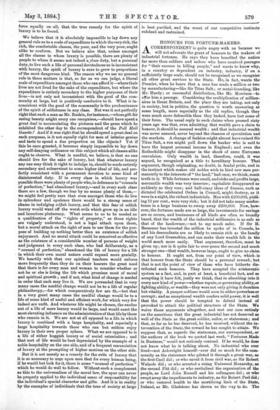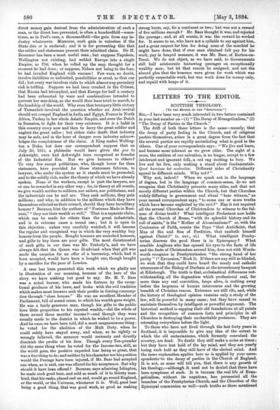HONOURS FOR FORTUNE.MAKERS.
ACORRESPONDENT is quite angry with us because we will not advocate the grant of honours to the makers of industrial fortunes. He says they have benefited the nation far more than soldiers and sailors who have received peerages for "their success in killing people," and wants to know why, in a country so dependent on industry, industry, if on a sufficiently large scale, should not be recognised as we recognise all other great services to the State. He, in fact, wants the Premier, when he hears that a man has made a million or two by manufacturing—like Sir Titus Salt ; or metal-founding, like Mr. Hardy ; or successful distribution, like Mr. Morrison—to offer him a peerage. Considering the multiplication of million- aires in Great Britain, and the place they are taking, not only in society, but in politics, the question is worth answering at some length, more especially as the old replies, though they were much more defensible than they looked, have lost some of their force. The usual reply to such claims when pressed sixty years ago was that, even admitting that wealth gave a claim to honour, it should be assured wealth ; and that industrial wealth was never assured, never beyond the chances of speculation and the markets. A change of fashion might almost have ruined Sir Titus Salt, a run might pull down the banker who is said to have the largest personal income in England ; and even the Rothschilds might disappear in the shock of some European convulsion. Only wealth in land, therefore, could, it was argued, be recognised as a title to hereditary honour. That argument, though originating, no doubt, in feudal pride, and in the instinct which makes old nobles wish to bind new men per- manently to the interests of "the land," had once, we think, much truth in it. While fortunes were small, and risks and profits large, mercantile wealth was very insecure ; capitalists disappeared as suddenly as they rose ; and half-crazy ideas of finance, such as dictated the celebrated Orders in Council, might destroy, as it were in a night, the richest industrials. Men with £200,000, yield- ing 12 per cent., were very rich ; but it did not take many misfor- tunes in a large business to sweep away £200,000. Now, how- ever, the fortunes made are so large, the investments for savings are so secure, and businesses of all kinds are often so broadly based, that the wealth of the industrial millionaire is as safe as that of the landowner,—not to say much safer. If Sir H. Bessemer has invested the million he spoke of in Consols, he and his descendants are as likely to remain rich as the family of any Lord Greenshire, and can make their wealth felt in the world much more easily. That argument, therefore, must be given up ; nor is it quite fair to over-press the second and much stronger one—that wealth, however large, ought to give no claim to honour. It ought not, from our point of view, which-is that honour from the State should be a personal reward ; but that is not the point of view of those who have hitherto dis- tributed such honours. They have accepted the aristocratic system as a fact, and, in part at least, a beneficial fact, and so accepting it have felt, justly we think, that in absorbing into it every new kind of power—whether repute, or governing ability,or fighting ability, or wealth—they were not only giving it duration but vitality. A pauper noblesse would soon be either powerless or corrupt; and as exceptional wealth confers solid power, it is well that the power should be tempted to defend instead of provoked to attack the political structure of the State. We waive those arguments altogether, and rest our case entirely on the assertions that the great industrial has not deserved as well of the State as the great soldier, sailor, or statesman ; and that, so far as he has deserved, he has received, without the in- tervention of the State, the reward he has sought to attain. We suppose that, as regards the statesman, our correspondent, or the authors of the book we quoted last week, "Fortunes Made in Business," would not seriously contend. If he would, he does not know what he is talking about. No industrial who ever lived—not Arkwright himself—ever did so much for the com- munity as the statesman who piloted it through a great war, as the first Cecil did ; or who saved it from civil war, as Sir Robert Walpole did ; or who arrested a rising Universal Monarchy, as the second Pitt did ; or who revitalised the organisation of the people, as Lord John Russell and his colleagues did ; or who swept away the impediments to industry, as Sir Robert Peel did ; or who restored health to the mortifying limb of the State, Ireland, as Mr. Gladstone has shown us the way to do. The direct money gain derived from the administration of such a. man, or the direct loss prevented, is often a hundredfold—some- times, as in Peel's case, a thousandfold—the gain from any in- dustry whatsoever. Moreover, such gain is valueless if the State dies or is enslaved ; and it is for preventing this that the soldier and statesman present their admitted claim. Sir H. Bessemer has been a most useful man ; but suppose Napoleon, Wellington not existing, had welded Europe into a single Empire, as Pitt when he rolled up the map thought for a moment he had done ; or suppose, Nelson not being to the fore, be had invaded England with success ! Few wars, no doubt, involve liabilities so unlimited, possibilities so cruel, as that one did ; but every war involves risks to which almost any pecuniari, risk is trifling. Suppose we had been crushed in the Crimea, that Russia had triumphed, and that Europe for half a century had been exhausted by wars and combinations intended to prevent her marching, as she would then have tried to march, to the headship of the world. Why even that trumpery little victory of Tamanheb involved the question whether an Arab revival should not compel England in India and Egypt, France in North Africa, Turkey in her whole Asiatic Empire, and even the Dutch in Sumatra, to fight for their very existence. It is a habit in this country every now and then to decry the great soldier and neglect the great sailor ; but either risks death that industry may be safe, and in the hour of danger even industry acknow- ledges the completeness of the claim. A King makes Welling- ton a Duke, but does our correspondent suppose that on July 20, 1815, a plebiscite would have given the pas to Arkvvright, even had Arkwright been recognised as founder of the Industrial Era. But we give honours to others? To very few except politicians, who, though lower far than statesmen, have provided for those' statesmen fulcrum, to lawyers, who under the system as it stands must be promoted, and to the solidly rich, under the theory of which we have already spoken. None of the workers, except in part the lawyers, are or can be rewarded in any other way ; for, in theory at all events, we give wealth neither to soldiers, nor sailors, nor politicians, and the industrials can be and are. They seek millions, they gain millions ; and why, in addition to the millions which they have themselv.es selected as their reward, should they have hereditary honour ? Because, hint the authors of "Fortunes Made in Busi- ness,"" they use their wealth so well." That is a separate claim, which can be made for others than the great industrials, and is in extreme cases a sound one ; but it is open to this objection : unless very carefully watched, it will become the regular and recognised way in which the very wealthy buy honour from the people. Bought honours are smirched honours, and gifts to buy them are poor gifts. The most disinterested of such gifts in our time was Mr. Peabody's, and we have always felt that the Queen was ill-advised when that gift was made thp occasion for an offer of a baronetcy, which, had it been accepted, would have been a bought one, though bought by a sacrifice for the poor of London.
A case has been presented this week which we gladly use in illustration of our meaning, because of the hero of the story we have nothing but good to say. Mr. M. T. Bass was a noted brewer, who made his fortune by the excep- tional goodness of his brew, and broke with the evil tradition which makes most brewers seek their profits in forcing consump- tion through "close houses." He was an excellent Member of Parliament, full of sound sense, to which his wealth gave weight. He was a fairly generous man, though his gifts to the public bore little proportion to his reputed wealth,—did the whole of them exceed three months' income ?—and though they were usually made to the district in which he wished to be a power. And he once, we have been told, did a most magnanimous thing : he voted for the abolition of the Malt Duty, when he could safely have stayed away, and when, as he rightly or wrongly believed, the measure would seriously and directly diminish the profits of his firm. Though every Ten-pounder did the same thing when he voted for the Income-tax, still, as the world goes, the positive expected loss being so great, that was a fine thing to do; and neither by his character nor his position would the Peerage have been injured, if Mr. Bass had accepted one when, as is said, one was offered for his acceptance. But why should it have been offered ? Because, says admiring Islington, he made such good beer, and sold so much of it to thirsty man- kind, that his casks, placed end on end, would go round England, or the world, or the Universe, whichever it is. Well, good beer being a good thing, that was good work, as good as making strong boots, say, for a continent or two ; but was not a reward of five millions enough P Mr. Bass thought it was, and rejected the peerage ; and, at all events, it was the reward he worked for. It seems to us, who have not a syllable to say against him, and a great respect for him for doing none of the mischief he might have done, that if ever man obtained full pay for his work, pay in heaped measure, it was Mr. Bass, of Burton-on- Trent. We do not object, as we have said, to Governments still half aristocratic bestowing peerages on exceptionally wealthy men ; but let that reason be assigned, and not the absurd plea that the honours were given for work which was perfectly respectable work, but was work done for money only, and repaid with heaps of it.



































 Previous page
Previous page